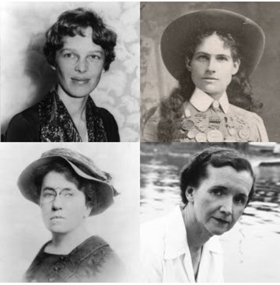AMERICAN EXPERIENCE will present a special salute to "Women in History" this May with encore broadcasts of four films that celebrate extraordinary women: Amelia Earhart, Annie Oakley, Emma Goldman and Rachel Carson. From the groundbreaking work of the scientist who launched the modern environmental movement to the fearless aviator who set world records, these stories explore the lives of women who became famous - or controversial - for following their own paths, regardless of the consequences, and whose achievements are still remembered today.
Descriptions and schedule for the four encore broadcasts are below.
The first woman to fly solo across the Atlantic, Amelia Earhart was one of America's earliest celebrities. After only a few years as a pilot she became the best-known female flier in America, not only for her daring and determination, but also for her striking looks and outspoken personality. Amelia even had an uncanny resemblance to Charles Lindbergh - the most famous man in America at the time - earning her the nickname "Lady Lindy." Three weeks short of her 40th birthday, Earhart disappeared over the Pacific Ocean, and her story became legend.
She was the toast of New York, London, Paris, and eventually the world. She was "adopted" by Indian Chief Sitting Bull, charmed the Prince of Prussia, and entertained the likes of Oscar Wilde and Queen Victoria. Annie Oakley excelled in a man's world by doing what she loved and won fame and fortune as the little lady from Ohio who never missed a shot. Annie Oakley is the story of a five-foot, 100-pound sharp shooter who pulled herself out of the depths of poverty to become an iconic performer known the world over as a symbol of the Wild West.
For nearly half a century, Russian emigrant Emma Goldman was the most controversial woman in America, taunting the mainstream with her fervent attacks on government, big business, and war. To the tabloids, she was "Red Emma, Queen of the Anarchists," but many admired Goldman for her defense of labor rights, women's emancipation, birth control, and as a fearless writer, and merciless publisher.
When Rachel Carson's Silent Spring was published in 1962, the book became a phenomenon. A passionate and eloquent warning about the long-term dangers of pesticides, the book unleashed an extraordinary national debate and provoked vigorous attacks from the chemical industry. But it also inspired President
John F. Kennedy to launch the first-ever investigation into the public health effects of pesticides - an investigation that eventually would result in new laws designed to protect and preserve the environment.

